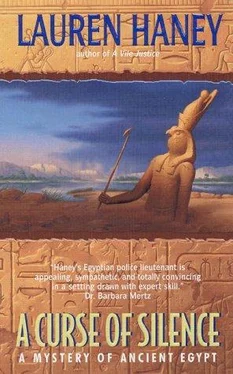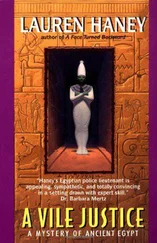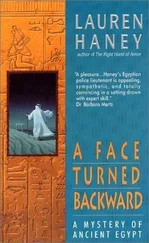Lauren Haney - Curse of Silence
Здесь есть возможность читать онлайн «Lauren Haney - Curse of Silence» весь текст электронной книги совершенно бесплатно (целиком полную версию без сокращений). В некоторых случаях можно слушать аудио, скачать через торрент в формате fb2 и присутствует краткое содержание. Жанр: Исторический детектив, на английском языке. Описание произведения, (предисловие) а так же отзывы посетителей доступны на портале библиотеки ЛибКат.
- Название:Curse of Silence
- Автор:
- Жанр:
- Год:неизвестен
- ISBN:нет данных
- Рейтинг книги:3 / 5. Голосов: 1
-
Избранное:Добавить в избранное
- Отзывы:
-
Ваша оценка:
- 60
- 1
- 2
- 3
- 4
- 5
Curse of Silence: краткое содержание, описание и аннотация
Предлагаем к чтению аннотацию, описание, краткое содержание или предисловие (зависит от того, что написал сам автор книги «Curse of Silence»). Если вы не нашли необходимую информацию о книге — напишите в комментариях, мы постараемся отыскать её.
Curse of Silence — читать онлайн бесплатно полную книгу (весь текст) целиком
Ниже представлен текст книги, разбитый по страницам. Система сохранения места последней прочитанной страницы, позволяет с удобством читать онлайн бесплатно книгу «Curse of Silence», без необходимости каждый раз заново искать на чём Вы остановились. Поставьте закладку, и сможете в любой момент перейти на страницу, на которой закончили чтение.
Интервал:
Закладка:
The pair strode along the broad walkway atop the wall to join Bak and Nebwa on the imposing tower that formed the sharpest corner of the roughly triangular stronghold.
Amonked raised his staff of office in greeting, scanned the panorama spread out before him, and smiled as if all was right with the world. “You may have to lower me down that wretched tower with a rope, but the view from up here is spectacular enough to make the humiliation worthwhile.”
The genial smile faded, replaced by a gravity befitting the inspector. He studied the fortress’s commanding posi tion on the island, the immense expanse of landscape vis ible all around, and the water flowing on all sides, a moat provided by the gods. The island was little more than a gigantic rock on which pockets of earth supported trees, brush, and a few hard-won garden plots. A place easy to defend and difficult to assault. Yet, like Buhen and the other fortresses along the Belly of Stones, it had fallen more than once in the past, when official neglect had left it poorly manned, its too few troops abandoned.
Across the western channel, the caravan could be seen, reduced in size by distance. The donkeys, returned from their island refuge, grazed on the trampled weeds and grass south of the encampment. The piles of foodstuffs and equipment which had proven such useful obstacles during the fighting had been redistributed in preparation for the next segment of the journey south, the long march to
Semna.
“Have you and Lieutenant Horhotep finished your in spection, sir?” Nebwa asked.
Bak resisted a smile. Since fighting at Amonked’s side, what had remained of the troop captain’s resentment had melted away and his use of the word “sir” was a true sign of respect.
“We have, and I must admit I’m impressed. At least half the space inside these walls is unused, a veritable garbage dump, but the small force here has made the utmost use of the remainder.”
“We do what we can, sir,” Ahmose said pedantically.
Amonked looked down at the prisoners and his smile faded. “What shall we do with those men?”
Bak queried Nebwa with a glance. He was not sure if the question was rhetorical or genuine. The troop captain shrugged, as mystified as he.
“I believe all threat of a coalition has been banished for some time,” Bak said, assuming the inspector truly wanted their counsel. “Hor-pen-Deshret has lost credibility. Thanks to him, there’s not much likelihood that any other man who covets riches and power will be able to lure men from the desert in numbers anywhere near those we faced yester day.” Ever mindful of Ahmose’s mission and their sover eign’s wish to tear the army from the Belly of Stones, he added, “For how long we can lay down our guard, I make no prediction.”
“Even if tempted, the tribesmen would refuse,” Nebwa added. “At least, in the near future. Too many men are dead and injured, leaving too many families alone and hungry, women and children and the aged who must now be fed by the more fortunate among them.”
Amonked walked to a crenel and looked at the men whose fate he held in his hands. “By rights, we should send to Waset all who are well enough to travel, offering them as servants to the royal house and the mansion of the lord
Amon.”
“We’d need extra men, at least a company of spearmen, to guard them on the journey north,” Ahmose said, “and we can’t keep them here while we await the arrival of troops from some distant garrison. We’ve no supplies to spare, and our next shipment of grain won’t come until long after the harvest in Kemet. Without that, we’ve nothing to trade locally for the more perishable fruits and vegetables we’d need.”
Eyeing the patchwork of fields along the river, Amonked asked, “Could not the captives help with the harvest, thereby earning their keep?”
Nebwa barked out a laugh. “The farmers would subject them to slavery-or, more likely, let them starve.”
“What of Semna?” the inspector asked, untroubled by what came close to ridicule.
“It and its sister fortresses sit in a land devoid of life,”
Ahmose explained. “What food and supplies they don’t re ceive from Kemet, they must get by barter from traveling merchants.”
“We can’t take them with us on the caravan.” Bak said no more, the reasons too obvious to relate, too much like those given for Askut and Semna.
With much to think about and the choices limited,
Amonked turned his back on his advisers to pace up and down the walkway, head lowered, hands clasped behind him. Bak rubbed the bandage on his thigh, a poor substitute for scratching the scabbed-over and itchy wound. He knew what he would do, but the decision was not his to make.
Nebwa and Ahmose also remained mute, an ordeal if their faces told true.
Amonked soon rejoined the three officers. “I know men in the royal house who would order us to slay the tribes men.” Neither his face nor his voice betrayed what he thought of the idea. “They would say we fought a battle and won it fairly. We’ve earned the right to cut off their hands and count them.”
Bak had heard grizzled veterans tell tales of hundreds upon hundreds of hands submitted to some lofty general in expectation of reward: the gold of valor, a portion of enemy wealth, captives who would make suitable servants. All very well in a major conflict, with king facing king on the field of battle, but here?
“We’ve fought no war,” he said, “only a minor, local skirmish led by a man bent on theft. The taking of hands would be inappropriate, as would the death of all these men.” What had he said to Pawah while awaiting the en emy? “This is no local skirmish; men will die.” And they had. Many men on both sides.
Amonked flashed him a look of… relief? “Shall we set them free?”
Bak stifled a smile. “Other than slay them, sir, which would leave their women and children to walk the desert sands alone and fearful, many to die of starvation and want,
I know not what else we can do with them.”
“Turn them loose,” Nebwa said in his usual blunt man ner. “I see no need to wipe out whole families merely to boast that I won a small victory.”
Ahmose hastened to second the suggestion. “I can spare enough food to see them on their way and sufficient men to escort them into the desert.”
“So be it.” Amonked, seemingly unaware of their relief, leaned into the crenel and his eyes settled on a dozen or so men seated in the shade slightly apart from the rest. The fallen head of the enemy coalition and the surviving mem bers of his tribal unit. “What of Hor-pen-Deshret?”
“Now there’s a man whose hand I’d gladly take,” Nebwa growled, scowling at his longtime foe.
“He can’t be set free,” Ahmose stated. “He fled once into the desert, and here he is again. As certain as I am of the lord Re’s return tomorrow, I know he’d come another day.”
“I suggest you take him to Kemet,” Bak said. “His pres ence in the royal house should pacify our sovereign for our failure to enslave or slay the rest.” He had heard that Maat kare Hatshepsut enjoyed seeing powerful men kneeling low before her, their foreheads on the floor. A tale he deemed unwise to repeat to her cousin.
Amonked’s eyes twinkled, as if he had read the thought.
“Give him an hour alone, time enough to weigh his guilt with no friends or allies to offer support, then bring him before me in Lieutenant Ahmose’s office.”
“Hor-pen-Deshret. Horus of the Desert.” Amonked sat stiff and straight on Ahmose’s low-backed chair, which had been made as comfortable as possible, thanks to several thick pillows the lieutenant’s wife had brought. As it had no arms, he rested one hand on a plump thigh and held his baton of office in the other. “Don’t you think the name a bit presumptuous?”
Читать дальшеИнтервал:
Закладка:
Похожие книги на «Curse of Silence»
Представляем Вашему вниманию похожие книги на «Curse of Silence» списком для выбора. Мы отобрали схожую по названию и смыслу литературу в надежде предоставить читателям больше вариантов отыскать новые, интересные, ещё непрочитанные произведения.
Обсуждение, отзывы о книге «Curse of Silence» и просто собственные мнения читателей. Оставьте ваши комментарии, напишите, что Вы думаете о произведении, его смысле или главных героях. Укажите что конкретно понравилось, а что нет, и почему Вы так считаете.












